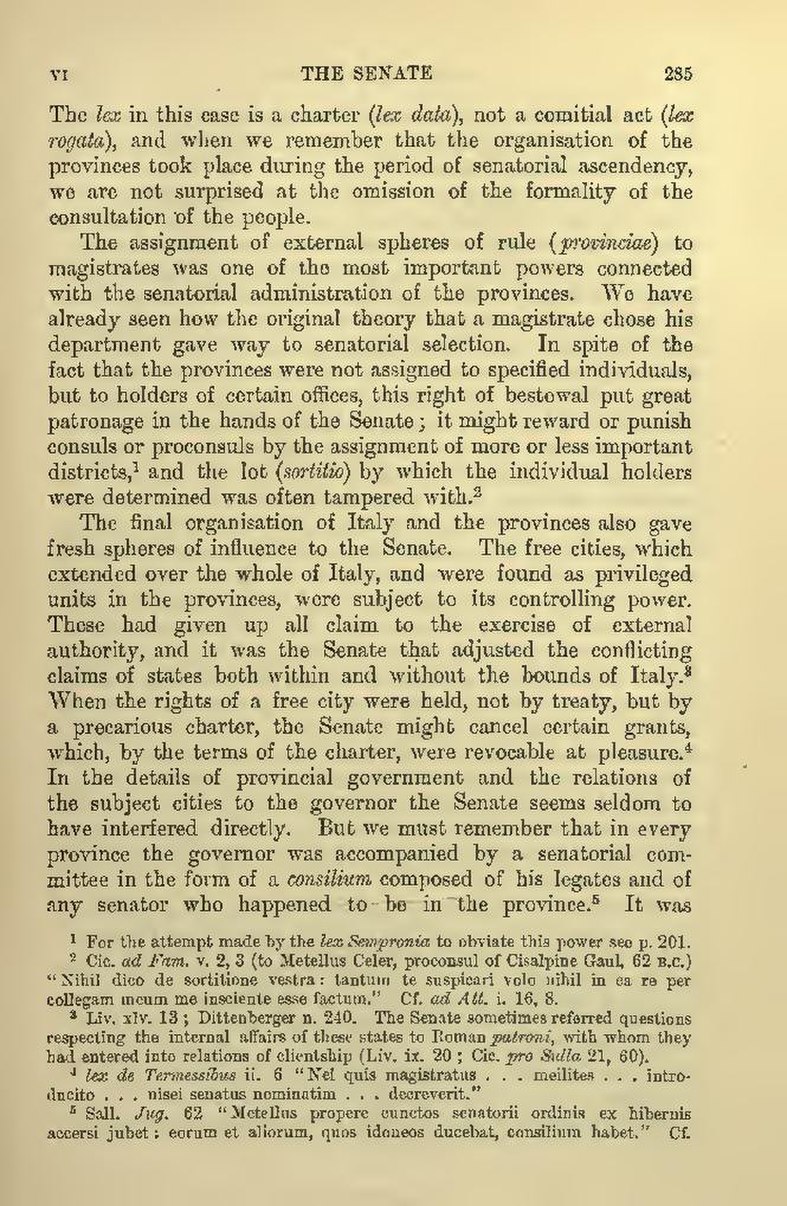The lex in this case is a charter (lex data), not a comitial act (lex rogata), and when we remember that the organisation of the provinces took place during the period of senatorial ascendency, we are not surprised at the omission of the formality of the consultation of the people.
The assignment of external spheres of rule (provinciae) to magistrates was one of the most important powers connected with the senatorial administration of the provinces. We have already seen how the original theory that a magistrate chose his department gave way to senatorial selection. In spite of the fact that the provinces were not assigned to specified individuals, but to holders of certain offices, this right of bestowal put great patronage in the hands of the Senate; it might reward or punish consuls or proconsuls by the assignment of more or less important districts,[1] and the lot (sortitio) by which the individual holders were determined was often tampered with.[2]
The final organisation of Italy and the provinces also gave fresh spheres of influence to the Senate. The free cities, which extended over the whole of Italy, and were found as privileged units in the provinces, were subject to its controlling power. These had given up all claim to the exercise of external authority, and it was the Senate that adjusted the conflicting claims of states both within and without the bounds of Italy.[3] When the rights of a free city were held, not by treaty, but by a precarious charter, the Senate might cancel certain grants, which, by the terms of the charter, were revocable at pleasure.[4] In the details of provincial government and the relations of the subject cities to the governor the Senate seems seldom to have interfered directly. But we must remember that in every province the governor was accompanied by a senatorial committee in the form of a consilium composed of his legates and of any senator who happened to be in the province.[5] It was*
- ↑ For the attempt made by the lex Sempronia to obviate this power see p. 201.
- ↑ Cic. ad Fam. v. 2, 3 (to Metellus Celer, proconsul of Cisalpine Gaul, 62 B.C.) "Nihil dico de sortitione vestra: tantum te suspicari volo nihil in ea re per collegam meum me insciente esse factum." Cf. ad Att. i. 16, 8.
- ↑ Liv. xlv. 13; Dittenberger n. 240. The Senate sometimes referred questions respecting the internal affairs of these states to Roman patroni, with whom they had entered into relations of clientship (Liv. ix. 20; Cic. pro Sulla 21, 60).
- ↑ lex de Termessibus ii. 6 "Nei quis magistratus . . . meilites . . . introducito . . . nisei senatus nominatim . . . decreverit."
- ↑ Sall. Jug. 62 "Metellus propere cunctos senatorii ordinis ex hibernis accersi jubet: eorum et aliorum, quos idoneos ducebat, consilium habet." Cf.
